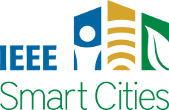About IEEE Smart Cities
IEEE Smart Cities brings together IEEE’s broad array of technical societies and organizations to advance the state of the art for smart city technologies for the benefit of society and to set the global standard in this regard by serving as a neutral broker of information amongst industry, academic, and government stakeholders.
The mission of the IEEE Smart Cities is:
-
To be recognized as the authoritative voice and leading source of credible technical information and educational content within the scope of smart cities identified below.
-
To facilitate and promote both the collaborative and individual work of its Member Societies regarding smart city technology.
Scope - The IEEE Smart Cities identifies and further develops technical best practices across the following functional and application domains within the context of urban infrastructure systems. These domains and the elements within them comprise the smart city framework which will be used to guide the Smart Cities technical activities. This framework may be expanded and refined as deemed necessary by the steering committee.
To learn more about the IEEE Smart Cities read about the Mission, Functional Domains and Smart Cities Applications.
There are 8 IEEE Partner Organizational Units. All members of the groups noted below receive complimentary access to IEEE Smart Cities material in the Smart Cities Resource Center.
- IEEE Communications Society - Join IEEE ComSoc
- IEEE Control Systems Society - Join IEEE CSS
- IEEE Industry Applications Society - Join IEEE IAS
- IEEE Power & Energy Society - Join IEEE PES
- IEEE Systems, Man, and Cybernetics Society - Join IEEE SMCS
- IEEE Intelligent Transportation Systems Society - Join IEEE ITSS
- Council on Electronic Automation Design - Join CEDA
- Council on RFID - Join CRFID

